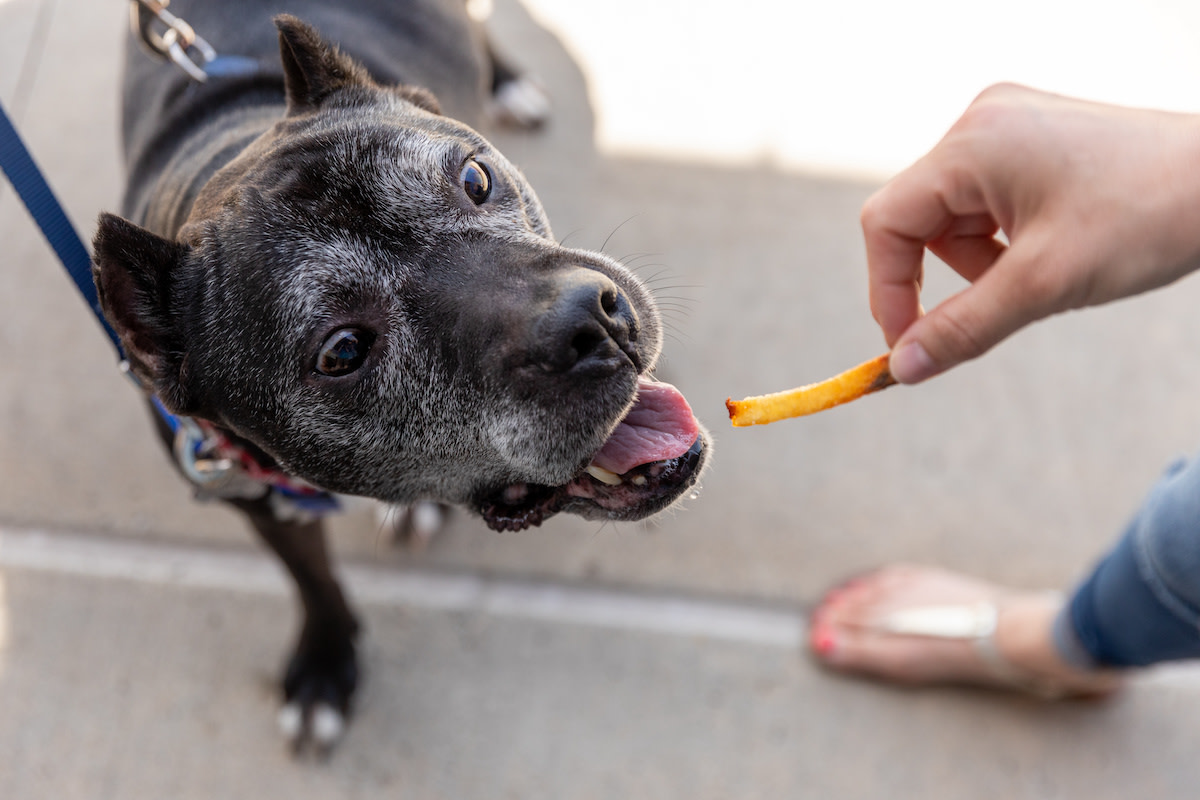Can Dogs Eat French Fries? 5 Risks of Canine Fry Consumption
Written by MasterClass
Last updated: Mar 24, 2022 • 3 min read
Dog owners wondering if dogs can eat french fries should know that this human treat isn’t toxic in small amounts. However, this popular human snack is still a high-fat junk food that isn’t advisable to feed to your pet, even as an occasional treat.
Learn From the Best
Can Dogs Eat French Fries?
If your dog ate a french fry or two off your plate, they likely wouldn’t experience a toxic reaction. However, this human food offers no nutritional value to contribute to your dog’s health, and excessive consumption could lead to health issues. French fries are high in salt, fat, and carbs, which can lead to canine weight gain.
Restaurant or fast food fries can be hazardous to dogs because of their exceptionally high salt content. Additionally, restaurant-prepared fries often contain seasonings harmful to dogs, like garlic or onion powder.
Instead of feeding your dog a french fry from the table, give them a different human food (like blueberries, lentils, or veggies) to enjoy as a healthy treat. Dog treats are also a healthy option to support your pup’s unique needs. Remember that most of your dog’s calories should come from a few portions of dedicated dog food.
5 Hazards of Feeding French Fries to Your Dog
Here are some of the health risks associated with feeding french fries to your dog:
- 1. Allergic reactions: Both fresh or fried potatoes may trigger allergic reactions in some dogs. (Sweet potatoes, however, are safe to feed to your dog when cooked properly.) Monitor your dog for symptoms of an allergic reaction (like hives or swelling) if they accidentally eat potatoes.
- 2. Salt content complications: French fries have a high salt content, and while your dog would need to eat a lot of them to suffer salt poisoning (which can be fatal), the risk exists of this happening in small dog breeds. Even a small increase in your dog’s regular salt consumption may lead to dehydration, thirst, high blood pressure, and more frequent urination. Additionally, condiments like ketchup add salt and sugar, which are unhealthy for your dog.
- 3. Inflammatory responses: Harmful saturated and trans fats found in the canola or vegetable oil used to cook french fries can upset a dog’s stomach. Short-term consumption of these unhealthy fats could cause life-threatening canine bloat, and long-term consumption may lead to your dog developing pancreatitis.
- 4. Upset stomach: High-carb fried food has a similar effect on a dog’s digestive system as it does on a human’s, leading to gastrointestinal distress.
- 5. Weight gain: Regularly feeding your pooch a fatty high-carb food like french fries can lead them to gain weight. To maintain your dog’s ideal weight, serve them dog food recommended by your veterinarian that meets all their nutritional needs.
What to Do If Your Dog Eats French Fries
If your dog eats a couple of french fries, they will most likely be fine. However, if your canine friend consumes your entire order of large fast-food fries, you’ll want to take some precautionary measures.
- 1. Supply your dog with water. Provide your pooch with access to plenty of water if they consume too many fries. The excess salt will make them thirsty, and the water can prevent dehydration.
- 2. Monitor for stomach distress. Upset stomach, diarrhea, or vomiting are the most likely side effects of canine fry overconsumption. Canine bloat is a more severe potential health problem to look out for, symptoms of which include dry heaving, excessive drooling, rapid breathing, anxious pacing, and abdominal pain and swelling.
- 3. Monitor for signs of salt poisoning. The most common signs of salt poisoning in dogs are extreme thirst and excessive urination. Still, your dog may also experience convulsions or spasms, weakness, nausea, tongue swelling, or difficulty walking properly. If you see any of these signs, contact a veterinarian immediately.
- 4. Monitor for signs of allergic reactions. Symptoms of allergic reactions to potatoes include difficulty breathing, hives, rashes, and excessive scratching.
- 5. Call your veterinarian. If your dog experiences any of the above health problems, promptly call your veterinarian for guidance.
Before Sharing With Your Pooch
Certain human foods can cause adverse reactions in canines, so always consult your veterinarian to determine whether it is safe to add these foods to your dog’s diet. This article is for educational and informational purposes and is not a substitute for medical or dietary advice.
Want to Learn More About Training the Goodest Boy or Girl?
Your dream of having a dog who understands words like “sit,” “stay,” “down,” and—crucially— “no” is just a MasterClass Annual Membership away. The only things you’ll need to train up a well-behaved pup are your laptop, a big bag of treats, and our exclusive instructional videos from superstar animal trainer Brandon McMillan.
